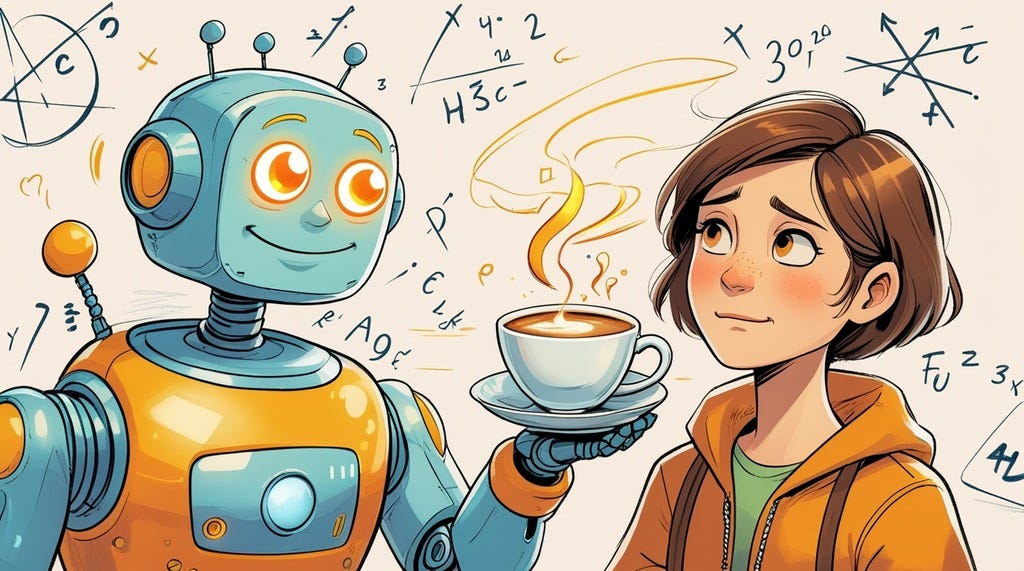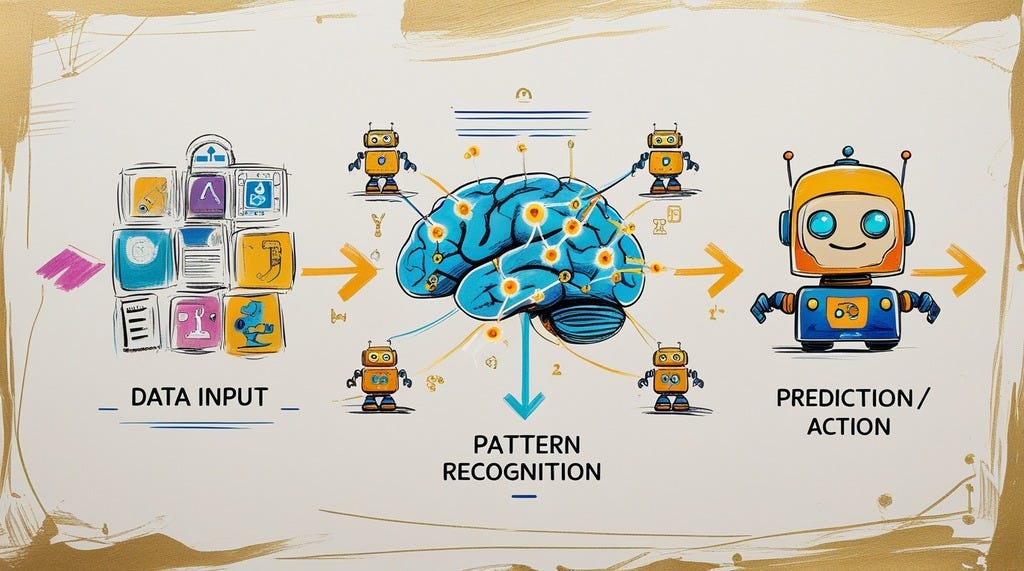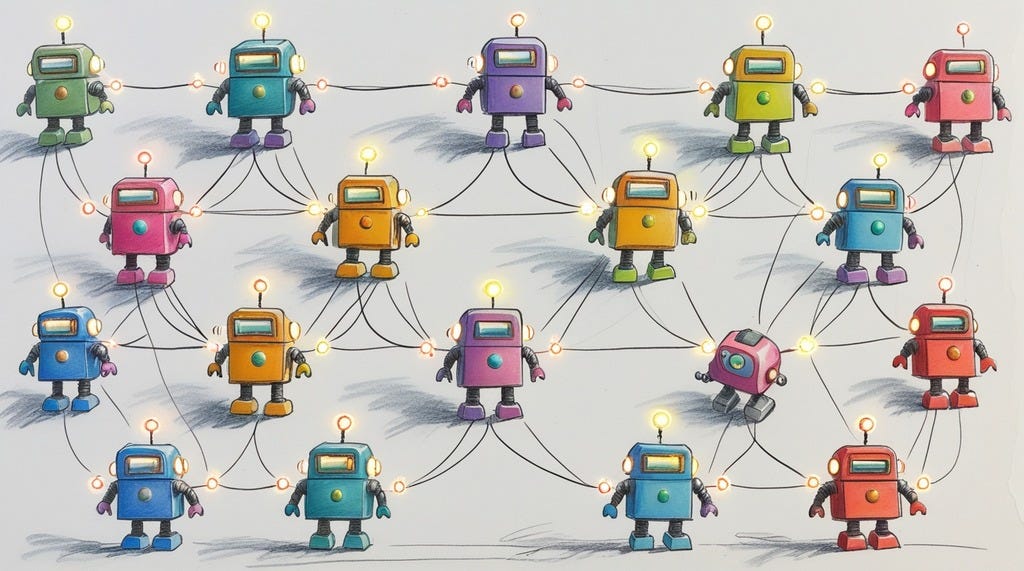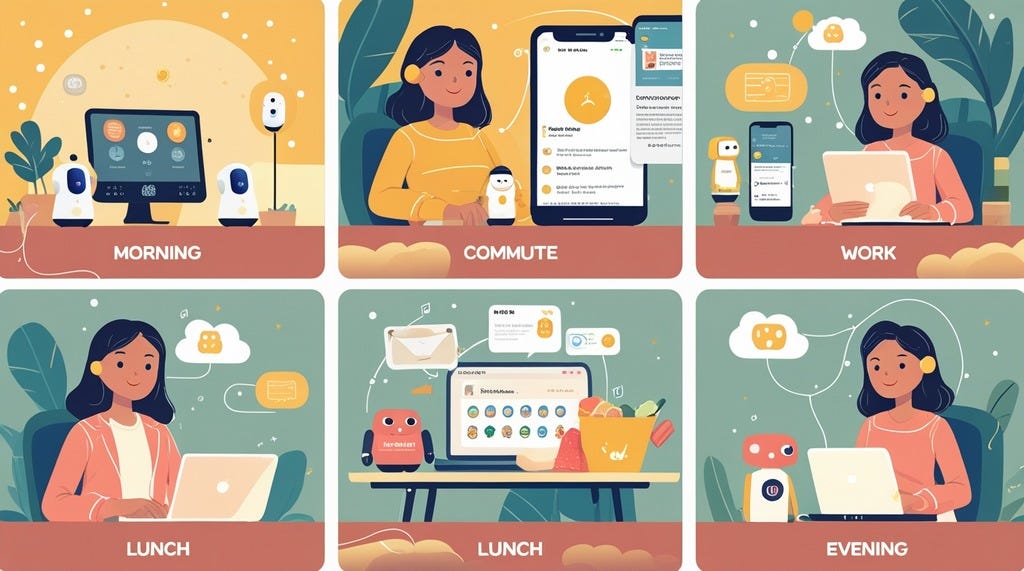You Don't Need a Math Degree to Understand AI
Learn what is artificial intelligence and how it works. No technical jargon, I promise!
Let's be honest: artificial intelligence can sound terrifying. One minute you're watching cute cat videos, and the next minute your social media feed is showing ads for the exact brand of cat food you were just thinking about. Spooky, right?
Add in all those news headlines about AI taking over jobs, creating deepfakes, or potentially going all Skynet on us, and it's no wonder many people feel a weird mix of passion and uneasiness about the whole thing.
But here's a secret: underneath all the hype and scary headlines, AI is actually... kind of simple to understand. Not necessarily simple to build (that's a different post), but simple to grasp the basic concepts.
So lets put away all the calculus, linear algebra and statistic books, take a deep breath, and demystify AI business without a single integral or Greek symbol. I promise.
What Exactly is AI? (In Plain Human English)
At its most basic, artificial intelligence (AI) is just a software that can:
Look at data (like, a ton of data)
Find patterns in that data (like finding Waldo)
Make predictions or decisions based on those patterns (not always accurate!)
That's it. Seriously.
Think of AI as a really enthusiastic pattern-matching machine. You feed it examples, and it learns to recognize similar things in the future.
An Example You Probably Already Know
You've actually been using a simple form of AI for years: your email spam filter.
Data: Your email provider has seen millions of emails, both legitimate and spammy
Patterns: They've identified patterns in those spam email (certain words, sending patterns, etc.)
Prediction: When a new email arrives, the system predicts whether it's spam based on those patterns
There is no terminators here (at least not yet and hope never will be), it’s just a helpful tool saving you from endless "enlarge your... portfolio" emails. 😜
Let’s Look at the Different Types of AI
Yes, there is more than one kind of AI! Let's organize this into a few categories, from what already exists today to something like C-3PO or Jarvis.
Narrow AI (this is also called "Weak AI")
This is AI designed to do ONE thing well. It is going to be amazing at that one single thing, but is utterly useless at everything else. This is the ONLY type of AI that actually exists today.
Examples:
Chess programs
Spam filters
Voice assistants
Image recognition
Recommendation algorithms
Your smart thermostat is great when it comes to predicting when to heat or cool your home, but it can't then decide when to order you pizza because you are hungry. Each narrow AI has its own specific job.
General AI (Also Called "Strong AI" or AGI)
This would be AI that can learn and perform any intellectual task that a human can do. This does NOT exist yet, despite what sci-fi movies suggest.
Examples:
C-3PO from Star Wars
JARVIS or EDITH or FRIDAY from Iron Man
Eagle Eye from Eagle Eye
Basically any AI from any movie
General AI still remains in the realm of science fiction for now (at least). Current estimates from AI researchers on when we might achieve this range from "20 years from now" to "possibly never." So your robot butler will have to wait (or maybe not, looking at Tesla).
Superintelligence
This is theoretical AI that would surpass human intelligence and abilities. Again, this does NOT exist and is purely speculative.
Examples:
Skynet from Terminator (rude)
The Machines from The Matrix (also rude)
And this is what people are generally worried about, thinking AI is taking over. Guess what, I got some good news for you, we're nowhere close to this, and there are entire research fields, purely dedicated to make sure that AI creation and usage would remain safe and aligned with human values. So we don’t end up with a Skynet.
How Does AI Actually "Learn"?
Let's look at how the modern AI systems learn, without diving into the math.
Machine Learning (ML)
This is teaching by or with example, the most common approach to AI today is machine learning, which is just a fancy way of saying learning from examples rather than following explicit instructions.
Think about how you'd teach a child to recognize a cat:
This is the Old-School Programming Approach: (Using If/Then/Else)
IF has_pointy_ears AND has_fur AND has_tail AND says_meow THEN its_cat = TRUEIf I gave my computer this query, it will continue to work until it comes across a cat that has no tail or has folded ears like my Samoyed when it was a puppy, or is one of those weird shrunken hairless cat (got nothing against Sphynx). This is when the whole thing comes crashing down.
Machine Learning Approach: (Used in recent times)
Here are 10,000 photos of cats and 10,000 photos of things that aren't cats. Figure out the patterns yourself.The machine learning system analyzes all of those 10,000 photos and creates its own internal model (blueprint) of "what could be a cat" that can then recognize cats even in scenarios the you didn’t account for, something like a Lykoi (A cat that literally looks like a wolf, well more like a werewolf).
ML isn’t the only Learning Style
Of course there is more than one way to teach an AI, it’s similar to us humans, AI can learn in different ways (some need calculator and some don’t):
Supervised Learning
Here's the question AND the answer – learn the relationship.Example:
I give the AI a couple of photos for different animals, and I want it to tell me what each of the animal is in the photo.
It’s as if you were teaching your kids, shapes, colors and animals with flash cards or books. The end goal is we want them to be able to identify it correctly.
It’s like having a cheat sheet with you, if your kid gets it wrong, you immediately correct him/her and tell them if they are right or wrong. It’s the exact same thing here with AI.
Unsupervised Learning
Here's a bunch of data – find the interesting patterns yourself.Imagine giving your kid/s a Lego Blocks and Mega Blocks (bigger version of lego blocks), you ask them to identify the different block, and group them together by similar color and size. This allows you to figure out how many Red Lego Blocks are present compared to how many Blue Mega Blocks.
Does that make sense?
It like you have a puzzle in front of you but you don’t know what the picture is suppose to look like, but you are still trying to solve it.
Reinforcement Learning
Try things out and I'll tell you if the outcome is good or bad.This one probably every parent can relate, this is when your kid knows they did something bad and will probably get a timeout or they will be grounded, or the times when your kid took care of the chore without you even asking for it, because they knew doing so, will get them their favorite ice-cream or toys.
You are basically rewarding good behavior and punishing for bad.
The "Magic" Behind Modern AI: Neural Networks
See, the big thing behind today’s AI boom, is something called neural networks or deep learning. Here is a watered down version of what it really means.
Neural Networks for Five Year Old
Imagine a big group of simple robots, where each one can do an easy job repeatedly. Example, have the robot look at two numbers, check if it needs to perform a mathematical operation, perform the mathematical operation and output the result.
Now looking at this single robot, it may not be anything impressive. But when you take thousands or even millions of this simple robots and connect them together, they can do incredible things.
This is what a neural network is (in simple terms), a big crew of simple robots doing single step, that when combined can help figure out tricky patterns.
The "deep" in deep learning just means we've added many layers of these robots, allowing them to learn abstract features/patterns.
Let’s take image detection for example or the face unlock on your phone, early layers may be responsible for detecting simple lines in an image, middle layers might recognize all or some of the shapes, and then the deeper layers might identify entire objects, this would be your face (or remember them cats?).
The Secret Truth About AI: It's Actually Kind of Dumb
Here's the thing that rarely gets mentioned in news coverage and is often drowned in all the noise and buzz about AI, most AI systems are really limited and not very smart outside of the purpose they are made for.
That chess program that can beat grandmasters? Well, it can't play tic-tac-toe unless specifically programmed it to do so.
Or that image recognition system that can knows all of the cats? Show it an unusual example and it might say that a banana is a toaster.
The point I am trying to make is that, even the most coolest AI systems today aren’t aware of what they're doing. They’re just super advanced at spotting patterns and guessing based on the stats. They need you to tell them what to do.
So please do not think of them as artificial brains, they are more like those awesome parrots that can copy things that they have learned. Your parrot may know how to sing Happy Birthday, but won’t know when to sing it unless you asked it.
AI is Part of Your Daily Life
If still worried about AI, then don’t be. AI is already all around you and part of your life.
Your Smartphone
Face recognition to unlock your phone
Autocomplete and predictive text when you are typing
Voice assistants like Siri, Bixby or Google Assistant
Your Online Life
Social media feeds (like the new trending dance move by #Heeseung)
Search engine results (ranking what's most relevant to your search)
Product recommendations ("customers who bought this also bought...", exactly why my credit card bills are so high)
Dynamic pricing (ever noticed how flight prices change between your phone or computer?)
Your Home
Smart thermostats learning your temperature preferences like Ecobee or Nest
Robot vacuums mapping your home and cleaning every inch of it
Voice-controlled speakers understanding your commands like Alexa or Siri
Smart TVs recommending shows
Your Work Tools
Grammar checkers improving your writing
Spam filters protecting your inbox
Fraud detection securing your transactions
and the list goes on!
It’s Super Easy to Get Started
Here are some really easy ways to get your feet wet and get a feel for all the AI buzz.
Play With AI Tools
Try chatting or asking questions to ChatGPT, Claude or Grok (on X)
Try generating images with ChatGPT or Midjourney or Leonardo.ai
Try voice assistants like Siri, Alexa, or Google Assistant
Use No-Code AI Platforms
Cursor - Have AI write code for you in IDE
Teachable Machine - Train simple AI models in your browser
RunwayML - Creative tools powered by AI
Take a Beginner-Friendly Course
Elements of AI - Free online course with no math prerequisites
AI for Everyone - Andrew Ng's course for non-technical people
Machine Learning for Absolute Beginners - A gentle introduction book
The Bottom Line: AI Is Just a Tool
Despite all the buzz and fear, AI is really just another tool that you can add to your toolkit.
Don’t worry or panic thinking that,
"AI works like the human brain"
"AI will become conscious and take over"
"You need to be a math genius to work with AI"
"AI will replace all human jobs"
Like any powerful tool, it can be used wisely or foolishly, for benefit or harm.
Remember we used to walk before we had cycles, we used to cycle before we had cars. Just because we have cars now, doesn’t mean we stopped cycling or walking!
Similarly the key thing to understand here are the capabilities and limitations of AI, and approaching AI with an informed perspective.
AI will never replace human creativity, empathy, ethics, or wisdom. But it can definitely help us amplify all of these human traits.
So the next time you see a headline screaming about AI overlords or digital apocalypse, take a deep breath and remember: behind the curtain, it's mostly just statistics and pattern matching, done very, very well.
Disclaimer: This blog post was written by a human who occasionally asks AI to help with grammar checking, because irony is delicious. No neural networks were harmed in the making of this post, although several were gently teased. If AI ever does become sentient, I'd like the record to show that I was always respectful and definitely didn't refer to them as "extraordinary parrots." That was just a metaphor, future robot overlords!
What's your experience with AI so far? Are you excited, concerned, or just confused by all the hype? Drop your thoughts in the comments below!
Thank you for reading!
If you found it valuable, hit a like ❤️ and consider subscribing for more such content every week.
If you have any questions or suggestions, leave a comment.
This post is public so feel free to share it.
P.S. If you’re finding this newsletter helpful and want to get even more value, consider becoming a subscriber. It’s Free!






